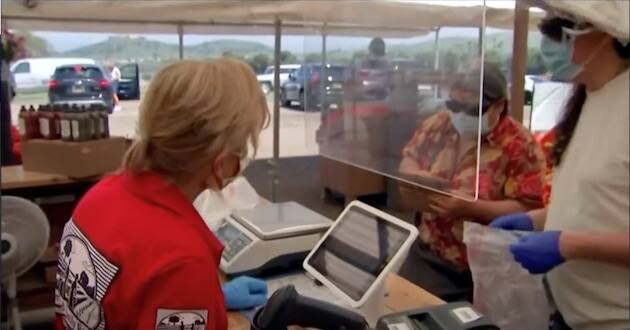The New York Times admits Covid security measures “make things worse”

Useless yet burdensome “security” measures really meant only to reassure people are no longer confined solely to airports. When the COVID -19 pandemic first began, we didn’t fully understand how the virus spread. But as we learned more about how it does—and does not—spread, our pandemic safety practices haven’t adapted.
Many supposed COVID-19 hygiene policies are essentially airport-style “security theater” at this point. But they’re not just useless. New reporting suggests that some supposed preventative measures, like plastic “shields” erected between people, may actually worsen the spread of COVID.
We’ve all seen them. They’re at the grocery store, at the cash register, or even in many schools separating teachers from pupils. Yet experts say the barriers aren’t working.
“Scientists who study aerosols, air flow and ventilation say that much of the time, the barriers don’t help and probably give people a false sense of security,” the New York Times reports. “And sometimes the barriers can make things worse.”
Indeed, a study published in the journal Science actually found that the use of desk shields separating students in classrooms was associated with an increased risk of COVID-19 spread. Why might that be?
“If you have a forest of barriers in a classroom, it’s going to interfere with proper ventilation of that room,” Virginia Tech engineering professor Linsey Marr told the Times. “Everybody’s aerosols are going to be trapped and stuck there and building up, and they will end up spreading beyond your own desk.”
“If there are aerosol particles in the classroom air, those shields around students won’t protect them,” University of California, Davis engineering dean Richard Corsi agreed. “Depending on the air flow conditions in the room, you can get a downdraft into those little spaces that you’re now confined in and cause particles to concentrate in your space.”
Simply put, plastic barriers don’t stop aerial spread. And they may even increase the chances of infection by obstructing the ventilation of the room. So, these barriers are more than just annoying. The security theater is possibly dangerous and counterproductive.
Some might argue that it doesn’t matter if these measures aren’t all highly effective. Why not take every possible precaution? And what’s wrong with making people feel better?
A lot, actually. This view is deeply naive and ignores the most basic lesson of economics: scarcity, opportunity cost, and trade-offs. The reality is we only have so much time and energy to devote to safety measures. The time and energy put toward one measure necessarily mean less put toward another. No one can or will take every precaution, and all restrictive measures come at a social, economic, and human cost.
So, it’s good news that even the New York Times is waking up to the perils of Covid security theater. Maybe soon they’ll realize that all pandemic restrictions, not just plastic barriers, come with serious trade-offs.
–Foundation for Economic Freedom | Reprinted with permission







